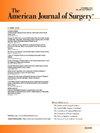老年乳腺癌腋窝分期趋势:在高使用率机构中明智选择的结果
IF 2.7
3区 医学
Q1 SURGERY
引用次数: 0
摘要
2016年,《明智选择指南》(Choosing Wisely guide)发布,建议对低风险老年女性乳腺癌患者省略前哨淋巴结活检(SLNB)。我们的研究评估了遗漏腋窝手术的趋势和相关因素。方法回顾性分析2014年至2022年在我院接受初步诊断为浸润性乳腺癌手术的≥70岁患者。对pT1、cN0、ER+/ her2患者进行亚组分析。结果共检出pT1、cN0、ER+/ her2患者218例。在这些患者中,SLNB的实施比例从2014年的73%下降到2022年的30% (p <;0.0001)。年龄较大(OR 0.82, 95% CI 0.73-0.91)和术前肿瘤大小较小(OR 3.63, 95% CI 1.62-8.14)与SLNB遗漏相关。遗漏SLNB的局部-区域无复发生存率(p = 0.57)和无病生存率(p = 0.66)无差异。结论随着腋窝分期的增加,对无复发生存无不利影响。本文章由计算机程序翻译,如有差异,请以英文原文为准。
Trends in Axillary Staging for Breast Cancer in the Elderly: Outcomes of Choosing Wisely at a High-Usage Institution
Background
In 2016, a Choosing Wisely guideline was published recommending omission of sentinel lymph node biopsy (SLNB) in low-risk elderly females with breast cancer. Our study evaluated trends and factors associated with omission of axillary surgery.
Methods
Patients ≥70 years old undergoing surgery for an initial diagnosis of invasive breast cancer from 2014 to 2022 at our institution were retrospectively reviewed. A sub-group of pT1, cN0, ER+/HER2-patients was analyzed.
Results
A total of 218 pT1, cN0, ER+/HER2-patients were identified. In these patients, the percentage of SLNB performed decreased from 73 % in 2014 to 30 % in 2022 (p < 0.0001). Older age (OR 0.82, 95 % CI 0.73–0.91) and smaller preoperative tumor size (OR 3.63, 95 % CI 1.62–8.14) were associated with SLNB omission. There were no differences in loco-regional recurrence-free survival (p = 0.57) and disease-free survival (p = 0.66) with SLNB omission.
Conclusions
With increasing omission of axillary staging, there was no adverse impact on recurrence-free survival.
求助全文
通过发布文献求助,成功后即可免费获取论文全文。
去求助
来源期刊
CiteScore
5.00
自引率
6.70%
发文量
570
审稿时长
56 days
期刊介绍:
The American Journal of Surgery® is a peer-reviewed journal designed for the general surgeon who performs abdominal, cancer, vascular, head and neck, breast, colorectal, and other forms of surgery. AJS is the official journal of 7 major surgical societies* and publishes their official papers as well as independently submitted clinical studies, editorials, reviews, brief reports, correspondence and book reviews.

 求助内容:
求助内容: 应助结果提醒方式:
应助结果提醒方式:


